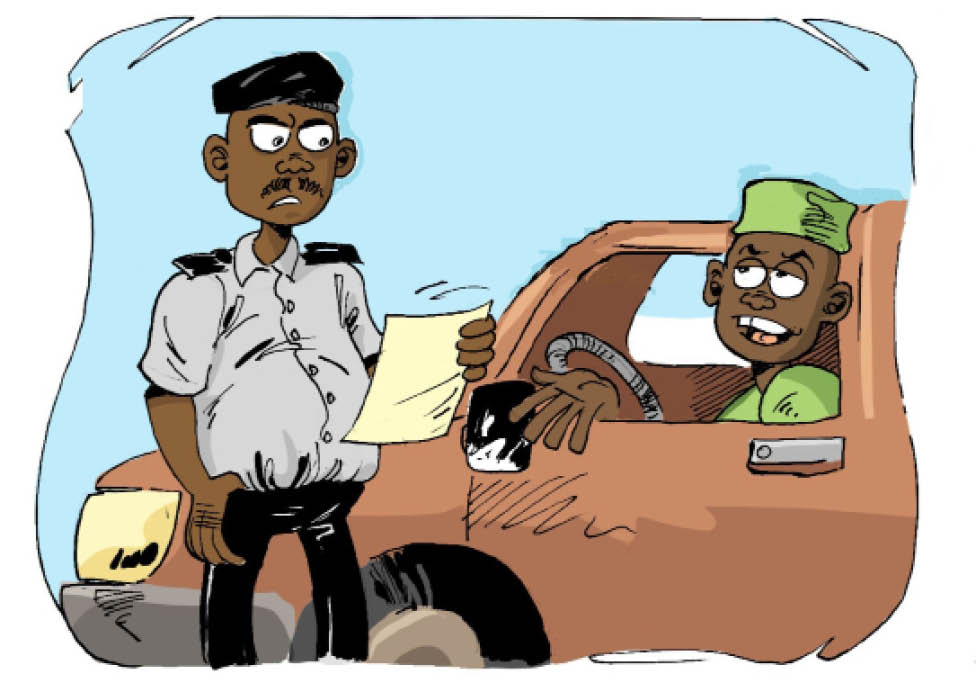There are lots of uniforms in this country. The police, military, paramilitary, private security guards, immigration, customs, cleaners and whatnots. The quality and colours of the uniform vary, so does the prestige or respect attached to each. Their roles also vary significantly, but what they have in common, by and large, is a culture of soliciting. They beg as if their lives depend on it. Shamelessly most times and in a manner that is most embarrassing of the institution they represent and the country they serve.
No Nigerian doesn’t have a story to tell of a solicitous uniformed agent, from those who won’t take down crime reports without being tipped to those who won’t move a finger without being incentivized to those who just can’t help themselves but solicit.
Recently, I had cause to visit an embassy. One of the first points of contact was some private guards stationed meters from the entrance. The man who seemed to be heading the team was at that point ordering lunch so I stood by to let him finish. There was a joke that passed between him and a food seller. All witnesses to this interaction, myself included, smiled.
The man looked at me for the first time and said, “Oga, this one wey you dey smile like this, na you go pay for my lunch”.
And that was the first point of interaction between us. It would have passed as a joke, one of those Nigerians casually share, except the man wasn’t joking. He was demanding. He proceeded to ask the food seller to collect her fee from me and seemed offended when I declined.
“Na because of you we dey siddon here,” he said.
I was impervious to his attempt to make me feel guilty or responsible for him doing his job. I had an appointment to keep, not to buy lunch for a random person at his duty post.
The speed at which his pretend-joviality disappeared would have been staggering if one had not witnessed before this transactional smile that our uniformed agents hand out with far more efficiency than they bring to their actual jobs.
The strangest encounter I had with one of these uniformed beggars was while travelling through the Nnamdi Azikiwe International Airport for a writers’ retreat. My fellow traveller and I had been cleared through all checkpoints with the regular “anything for the boys” at every point and had been stamped through immigration. On the way to the boarding gate, an immigration officer at a small counter beckoned us and demanded to see our passports. Thinking his presence there was strange, we handed them over. Flipping through the pages, he made small talks, asked where we were travelling to and what for, made comments about us being “big men”. Eventually, he came to the question that was most important for him.
“So, what do you have for us?” he asked, clasping his paws around our passports, making a show of this act.
We joked about him being the oga, about how it used to be customary for travellers to receive handouts from people to help them on their way. We laughed, all three of us. But when the man realised he was getting nothing from us, he slipped our passports under his counter and drew to his full height, the smile wiped off his face. “So, what do you have for us?” he demanded again, his tone very formal.
“I am afraid we have nothing,” I said.
“It’s like you people are not serious. When you are serious, you will do something,” he folded his arms, signalling his intent to waste our time.
I asked him why he was holding on to our passport when we should be heading to our boarding gates, he bluntly told us that we needed to give him “something” before we would get our passports back. His effrontery was stunning. It took a while to comprehend. My travel companion was shaken and asked if we should give the man something. I insisted we Shouldn’t. Our passport had already been stamped and that man had no business being there. He ignored us and moved on to a mother and daughter, asking them to empty the content of their handbags on the counter. They too were perplexed. What business has an immigration officer with the content of their bags after they had been cleared to board? It was clear he was only being officious, to appear to be doing something useful, something that had been done already. He made his demands. Money changed hands and shamelessly, he pocketed his loot and turned to us.
He reiterated that he was willing to waste our time, that we would miss our flights, I insisted he had no grounds to hold our passports and we are willing to wait.
Frustrated he started ranting, “Is it because you are writers? If I had wanted, I would have been a writer too, I would have been better than Chinua Achebe.”
I swear, it was the most bizarre encounter ever. Grudgingly, he reached under his desk and slapped our passports on the counter. We picked them up and left without a goodbye.
These days, passing through public places means exposure to a contagion of uniformed beggars and solicitors, from the police who mount checkpoints, create traffic chaos on the roads just so they could beg and extort only to disappear when their services are actually needed to the toilet cleaners who insist on holding tissue paper when they could easily leave it in the toilet, those who insist on turning on the tap for you to wash your hand and overbearingly wipe off the countertop with gusto so you tip them. When you ignore the hint, they too ask “Anything for the boys?” Those ones look like they could help unzip you or undo your drawstring if you let them. They seem intent on taking self-service out of the act of using public conveniences.
Over the years, a standard modus operandi has emerged for these begging. A formula of some sort.
Step One: The Smile and Hype. You are the oga, the chief, the alhaji. They sing your praises.
Step Two: Make You Beholden: they do this by self-effacing. They are the boys or girls, they are loyal to you, they say, they are hungry and thirsty because they are in your service as if you had kept them there.
Step Three: The Demand: they ask for money, something, anything for the boys, for the weekend. Sometimes it is subtle, like: “Madam, it is weekend o.” Or “Oga, we are just coming back from weekend.” Other times it is direct, like “Any naira you want to leave behind for your boys?”
Step Four: Desperation: It doesn’t always get to this but sometimes they look for an excuse to hold you and make subtle threats. They cook up stories about a process that would take time, or something missing, excuses that disappear once money changes hand.
Even those you have no business with will run after you to solicit, or to help you reverse your car, or park it, or open your car door.
This menace is a manifestation of a growing culture of sycophancy that apart from being obnoxious and embarrassing on a national level, constitutes grave dangers to society.
When security officials at public places use the charisma of their uniforms to focus more on soliciting than on their duties, the consequence is that those with criminal intentions can slip past if they drop “anything for the boys and girls.” Slip a fat naira note in the hands of the police at the checkpoint and they would salute you as you drive past with an armoury, a kidnapped person or stolen property in your boot.
Public institutions must be deliberate in tackling this plague, they must train and retrain their personnel and the National Orientation Agency, for instance, ought to sensitise the public on the dangers of encouraging such practices. We must not trade national security for 10 kobo handouts.




